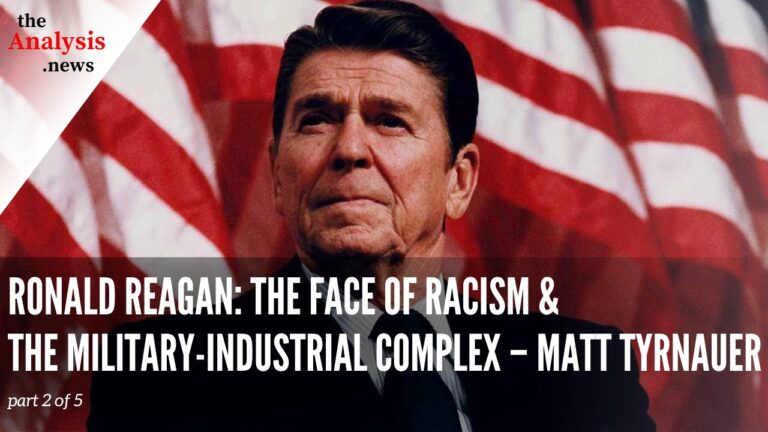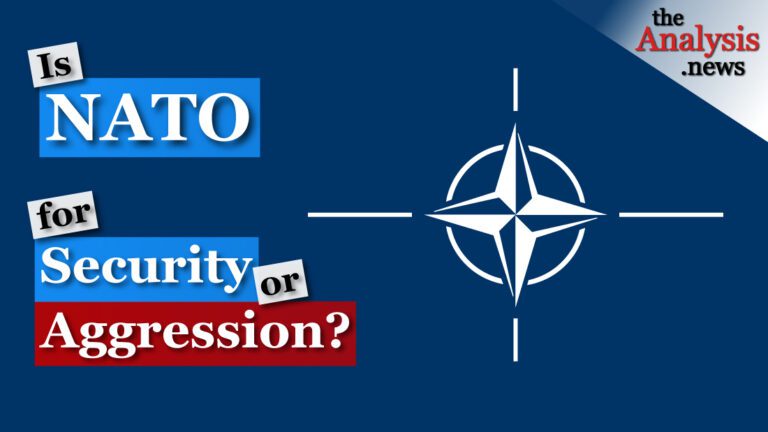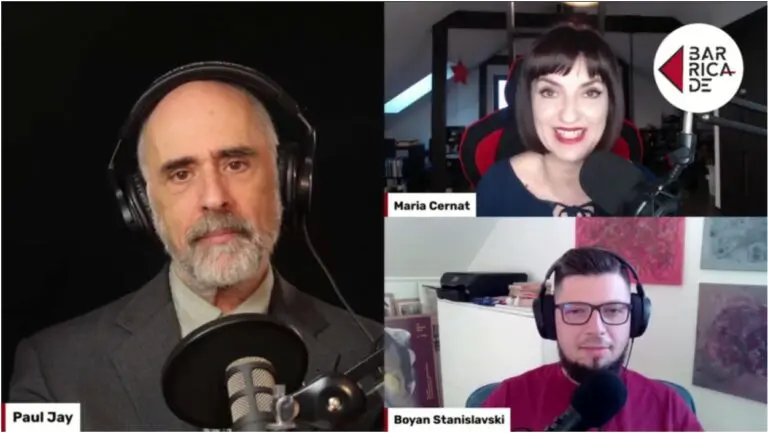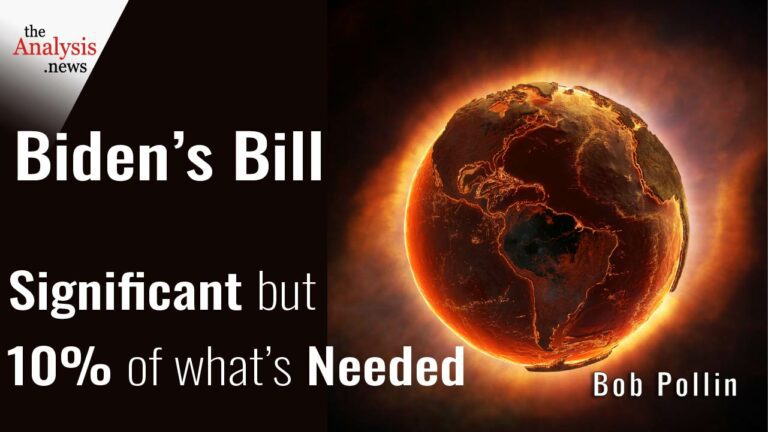In this episode of The Source, Zain Raza talks with filmmaker and journalist Paul Jay about YouTube censorship and the threat of nuclear war. In addition, we talk about the growing threat of war with China and why militarization is on the rise around the world.
TRANSCRIPT
Zain Raza
Thank you guys for tuning in today, and welcome to another episode of The Source. I’m your host, Zain Raza. And today, we’ll be talking to journalist filmmaker Paul Jay. He’s also the founder of the independent media network theAnalysis.news. Paul, thank you so much for joining us today.
Paul Jay
Thanks very much, Zain.
Zain Raza
It’s been a while. Let us begin with theAnalysis.news that you found last year. What is this platform all about?
Paul Jay
It’s basically not respecting any of the rules of the road of how you’re supposed to do video interviews on the internet, which is kind of shorter and punchier and all the rest. I decided I would do something that I just found interesting myself, which is to go deeper analytically. So they’re longer, and I hope in terms of understanding things from the point of view of class, and real, when I say historical context, I mean historical context through the view of class, that we get a little deeper than a lot of other things that are around.
Number two, something I’m pushing in the direction now, I want what we do to be more connected to people who are organizing. I mean, really in the ground. In January, I’m going to go down to West Virginia and do some stories about people organizing amongst West Virginia coal miners.
I have a series running now with a woman named Jane McAlevey, who actually does a lot of work in Germany and does a lot of training for organizers funded by the Rosa Luxemburg Foundation. I have a biographical series about how she’s learned how to organize to win power, she says. And I think that’s really critical to what I hope theAnalysis.news does, is that it orients viewers not just towards understanding things, but also with an eye on changing who has power, to whatever extent that’s possible.
Zain Raza
What sort of obstacles have you faced so far? So, for example, acTVism meaning this year, we have won zero subscribers. We started this year with 95,000 subscribers, and we now have 95,000 subscribers. And this has never happened on YouTube, and every year from 2013 onwards, we’ve always won hundreds, if not thousands. So, for example, in 2020, we won 50,000 subscribers, which was a really good year. And this year it’s been really difficult. Are you facing similar problems with reach and subscription on your channel?
Paul Jay
More than subscription, we were growing over the course of the first year to our videos doing 40, 50, 60, 80,000 views, regularly more than 10 to 20,000. Then when I did my reports on the events of January 6th, which essentially all of what I said later turned out to be true, which was that the events on the 6th were the final act of an attempted coup. And that there was a real attempt by [Donald] Trump and others to involve the military. And that January 6th was supposed to be the excuse for military intervention.
[Mike] Pence was supposed to refuse to certify [Joe] Biden’s election, and essentially there would be a putsch. I’ve said all this stuff, and YouTube took down my stories. They took down the first one. They took down the second one. They banned me from all advertising on all Google platforms forever.
I did another story which wasn’t even about January 6th. It was about the growth of Christian fanatical nationalism in the armed forces. But actually, I shouldn’t say it has nothing to do with January 6th; that’s actually the real story of January 6th. That’s why they thought there could be a coup because of these Christian nationalists, not only in the lower ranks but in some of the very highest ranks of the armed forces, especially in the Air Force.
So I won’t get into the detail of the January 6th story unless you want to, but in terms of YouTube, I had a warning. Then I had a first strike. They kept accusing me of spreading misinformation about the 2020 elections, in other words, claiming they had been won by fraud. Which all my stories were the exact opposite of that. All my stories were a denunciation of Trump.
So I was one away from being banned on YouTube. Matt Taibbi wrote an article and he has a regular thing called ‘The Censored.’ He got hold of YouTube PR people and told him he’s writing this piece about the censorship of the analysis and then knowing his column was coming out, and he’s got a big following, they back down, and they put back my stories. They took away my strike. They didn’t take away the warning. They gave me back the great privilege of buying ads on Google.
But since then, my views have gone down to next to nothing from in the thousands and tens of thousands. I’m lucky if one of my videos now does even 2,000. It’s a complete ghosting. I almost never get a video recommended, and I don’t know what we can do about it, other than start building our email list and getting people to go directly to our website theAnalysis.news because clearly, YouTube has it in for us.
And I can’t prove this, but there are two events that put me on the radar of the American security agencies. The first was during the Freddie Gray uprising in Baltimore. I was based there doing The Real News. We were right in the thick of the uprising. In fact, our building was practically ground zero for organizing as much as that was organized because a lot was spontaneous.
We’re right next to City Hall, where a lot of the big protests and rallies were taking place, and we were doing really the best coverage of what was going on. Much more than coverage, we were really connecting the Freddie Gray murder by the police to the reasons for chronic poverty. Not just saying, oh, people are poor, but saying the issue is the relations of production. It’s about people who own stuff and the concentration of ownership and the imposition of chronic poverty on Baltimore for the sake of low wages. And we know that the police organization in Baltimore was run by something called a Fusion Center, which was set up after 9/11. And these are the fusion of all the various intelligence agencies, the FBI, CIA, NSA, military intelligence, local police intelligence, State, all of them to coordinate their activities.
And there were a few other reports done by other news agencies about how the Fusion Center was actually guiding the Baltimore police on what was happening, including allowing in the beginning of the riots to allow looting and the burning of buildings to give police the excuse to attack the protesters.
In fact, we’re one of the only ones that really reported on the fact that, in fact, the police union accused the police chief of deliberately holding cops back. And we reported on the same thing during the G20, which also, I think, got us on their radar. The G20, in Toronto a couple of years before that. Where the police did exactly the same thing. They had provocateurs that started some fires in police cars. And instead of intervening, they actually let the police cars burn. They let a few 100 people run around breaking windows when most of the rally, the anti-G20 rally, was very peaceful. And they arrested 1,000 people with the excuse of, oh, look at these burning police cars.
So I think I got on the radar during the Toronto G20. I got on the radar during the Freddie Gray incident. And then when Julian Assange was arrested in his handcuffed hands as he’s coming out of the Ecuadorian Embassy, he’s carrying my book, which is my interviews with Gore Vidal on the History of the National Security State.
And in fact, I’m going to republish it in a few days the video of that interview. After that, Assange was arrested and my books out there. Well, it went viral. Practically every news organization in the world carried the story because the Washington Post interviewed me the next day and said, well, what did you make of Assange carrying your book? What did I make? I didn’t even know what had happened until the Post interviewed me about it, but it went viral.
So I think I really got on the — not just, I think [Daniel] Ellsberg told my wife the next day he said, be careful, you’re really on their radar now. So what I’m about to say, I can’t prove, but this is what I think happens. I think the FBI, and they’ve been doing this for a long time. There used to be COINTELPRO [Counter Intelligence Program] where the FBI would infiltrate organizations and deliberately cause division and try to split organizations, overthrow leadership. I think I was targeted by something like that.
I think that the FBI has algorithms that can intersect with YouTube, where they can flag certain people or organizations and either try to get the channel right off YouTube. But it’s just as effective to what they call ghosting and diminish the viewership. And how do you prove that your viewership is being diminished?
Well, after they took down my January 6th reports, our views dropped from thousands, tens of thousands. We’re lucky now, as I said, to do 1,000 or 2,000; it’s ridiculous. I know we have far more viewership than that. We can also see this from the website. So big tech is clearly intersecting with the security agencies.
Zain Raza
Yeah, Glenn Greenwald has done a lot of work on that. Basically the network between big tech and the national security state. And to touch upon WikiLeaks, this is also what happened. We put a lot of focus last year; we went to London twice and did a lot of work interviewing WikiLeaks directly, the campaigns on the Julian Assange campaign.
And it was at the end of this year, where if you look at our video production over the last eight years, more videos we produce more views and subscribers we got. Now, it doesn’t matter how many videos we produce; even if we topped it last year, it’s going exactly the opposite way. We’re getting less views and less subscribers.
So I do believe I think they call it shadowbanning, which is they change the algorithm, so you don’t get suggested to new viewership. I think there’s a way out. There’s a lot of alternative platforms developing: Rumble, Telegram. We need to look at that. And most importantly, we need to do what we’re doing today, which is talk with each other.
Anyways, I want to switch gears here before we go into other issues and talk about something that’s not been deserving the attention that it should. Especially now with the Corona coverage taking the forefront again, which some people will argue it should.
But nevertheless, there’s a bigger threat looming, which is the threat of nuclear war. You’ve been covering this story on your media outlet quite vigorously. Could you talk about the U.S. role in Taiwan and the rising threat with China? First, provide us with some context and then talk about the recent situation.
Paul Jay
I’ll try, there’s a story today of a Chinese submarine surfacing and sailing in the Strait between Taiwan and mainland China, and it’s a big kafuffle. Why is this submarine? It’s a nuclear-powered submarine with ballistic missiles, and they’re speculating that perhaps it needs repairs, which is why it’s up on the surface. But it’s an indication of just how dangerous the situation is.
The Taiwanese themselves are planning to build apparently eight submarines. The commander of the U.S. fleet in Japan says they have four or five American aircraft carriers in the region of the South China Sea and off the coast of Japan and Taiwan. He says he wants seven or eight. The Japanese are building their own submarine. The Chinese are apparently building on assembly lines, destroyers and submarines.
What are they going to do with all this stuff? What could they possibly do with all these submarines? The only thing they can do is create the conditions for an accident that could lead to a conflagration. The Americans cannot actually go to war with the Chinese over Taiwan without it getting to a point where the Chinese win the ground game, and the Americans are faced with a situation. Do they allow the Chinese to actually win, or do they go nuclear?
For people that watch theAnalysis.news, they know I’m doing a documentary now with Daniel Ellsberg based on his book Doomsday Machine. And I interviewed him recently. And one of the days we interviewed, he had a document in his hands, and it was a report commissioned by the Pentagon in 1964 of the Taiwan crisis of 1958.
And he says, this is still top-secret, what I’m about to read to you. I could be arrested, meaning Ellsberg, but so could you meaning Paul Jay and the crew. Are you sure you want to go ahead with this? And we all said, yeah, of course, we do.
So he read from the document. And essentially, it’s a report that has minutes from a meeting of the Joint Chiefs and other meetings of top-military leaders about, in 1958, Mao Zedong has told the Americans to get out of Taiwan; that it belongs to China. Americans refuse. And the Chinese started shelling one of these little islands that are very, very near the coast of mainland China as a sort of shot across the bow that you need to get out of here.
And so in the meetings, there’s minutes of the meeting, and one of the generals says to the other generals that President [Dwight D.] Eisenhower has already authorized the use of nuclear weapons if we can’t contain this with conventional warfare. And one of the other generals says, well, we know we can’t. They have way too many troops. There’s nothing we could do to really stop it if they want to use military force. And so one of the other generals says, well, we can’t let Taiwan fall. And this is the key line. He says our prestige and strategic position in Asia will be compromised. So one of the other generals say, well, what would the Soviet Union do? And a general says, well, they’ve said they will defend Chinese sovereignty. And if we use a nuclear weapon on China, even a small, low-yield whatever, and it’s just off the coast of where they’re shelling us from, the Soviet Union will probably have to respond. And what will that response be? Well, they might drop a nuclear weapon on Chiang Kai-shek in Taiwan. So one of the generals says, well, how could that? Then what? And then they say, well, then we have to respond. Well, that means nuclear war. And the first general says, well, maybe, but the alternative is worse.
What do they mean? Losing prestige and strategic positioning in Asia is worse than risking nuclear war. So Ellsberg concludes this by saying he does not believe that the plans or psychology of the American military planners has changed. It’s still the same.
Recently the review was commissioned of American nuclear war strategy, and the undersecretary, a woman who was supposed to be leading it, was seriously questioning whether the Americans should finally adopt a no first-strike declaration, and the Pentagon lobbied to get her removed. And they were successful. She was removed.
And a retired admiral at the time was quoted, I believe in the New York Times, as saying, our strategy has been the same for 60 years. There’s no reason it should change now. Which is, the strategy is, they’re willing to launch a nuclear attack if it looks like they’re going to lose a conventional war. Which has been the fundamental strategy right from when Ellsberg was working for RAND Corporation; the strategy was Europeans, pick up your ears.
The American strategy in the war plan was, and this was automatic. If one American battalion fought one Soviet battalion in Europe, it automatically triggered an all-out nuclear attack on the Soviet Union and China. Every major city in both countries would be targeted. But while the Soviets had, at least in the early ’60-’61, had very limited ICBMs, their ability to attack the United States was very limited. They had a lot of ability to take out Europe. And the American war plan was too bad for Europe.
Curtis LeMay, who was head of Stratcom, and some of the other military leaders were seriously advocating a first-strike on the Soviet Union, which really was the whole posture of the American nuclear war strategy—and always knowing that an American first-strike on the Soviet Union would mean the elimination of life in Europe. And supposedly, these Europeans keep saying, oh, we want to be under the American nuclear umbrella.
So what is it really all about? Ellsberg’s come to the conclusion, and I’ve sure come to the conclusion, maybe even further than Ellsberg. But Ellsberg says that as insane as all this is, the kernel of rationality in this whole game is that it’s all about money-making. It’s not really about anyone wanting to go to war. It’s about creating a rationale for massive expenditure in arms and nuclear war manufacturing. And the Europeans and the Canadians, I must say, all want a piece of that arms manufacturing gravy train. And they’re all willing to risk apocalypse for the sake of making profit. It’s utterly insane.
And the thing is that these geopolitical processes, and we’re seeing this now in Taiwan, you’ve got two things happening at the same time. You’ve got economic relations where the Chinese and American economies are entwined in a way the Soviet and American never were. And even now, with all the attention over Taiwan, Apple just gave a major contract to a Chinese company for the next generation of their cell phones. And at the same time, they gave one to Taiwan. They gave BlackRock, the biggest asset management firm in the world, ridiculous. They have something; I think it’s $8 trillion under management now. They just made a big investment in China, creating a big index fund and other investment funds.
So on one side, you’ve got an intertwining of the capitalist economies. You have this geo-military tension over Taiwan because the arms manufacturers, the more tense things are, the better it is for them. And they keep amping up the tension. Just what I said off the top, but these submarines that Taiwan and others are building, the United States is building something like 12 or 13 Ford-class Aircraft Carriers at the cost of something like $14 to $16 billion each. More than a dozen.
I saw a really interesting interview the other day, David Frum, the guy who used to write speeches for George Bush, Interviewing another big neocon brain. I forget which it may have been, Kate. I can’t remember which one it was, but one of the big neocon brains. Even he says aircraft carriers are absolutely useless. Both the Chinese and Russians have missiles that can take out aircraft carriers in minutes. They’re literally pointless. If there actually is a real fight, they’re gone.
The only reason to build these things is the amount of profit being made. The whole irrationality of capitalism, which is the underlying real issue here, is so crazy. Like, who are the biggest owners of the companies, corporations that make atomic bombs that are making the Ford-class Aircraft Carriers, who are the biggest investors, the exact same financial sector that’s putting money into China.
It’s entirely irrational, except that it’s all about profit-making. But it’s so damn dangerous because they’re playing with literally ending life on Earth because one damn accident, and there’s been a few over the years that have come within a hair of blowing us all up. And like Ellsberg and others have said, it’s a complete miracle that we’re still here.
As much as it’s important to focus on the question of climate change, and there’s no doubt it’s an existential threat, nuclear war is also, and in some ways, an even more immediate existential threat. So, yeah, we really need to talk about all this. And the idea of people in the climate change movement and activists, we all have to, no matter what people are involved with, we need to be educating, organizing around both climate and the issue of nuclear war.
Zain Raza
So, Paul, let us conclude part one right here and focus on Julian Assange and foreign policy in part two. Thank you so much for your time for part one.
Paul Jay
My pleasure. If you could call talking about nuclear war a pleasure.
Zain Raza
And thank you guys for tuning in. Don’t forget to subscribe to our YouTube channel to watch part two, where we will focus on Julian Assange and more on foreign policy. And donate so we can continue to produce independent, non-profit news and analysis. I’m your host, Zain Raza. See you guys next time.
The Source Announcement
These are the building blocks that make up our organization and the goals we would like to achieve in order to continue our journalism until 2022 and realize these values fundamental to our democracy. We need 1,000 supporters in our crowdfunding campaign, donating only €5 or dollars per month via Patreon or bank account. Right now, we have only 200 supporters and are not able to take the next step. Our future is in your hands. Strengthen independent journalism and be part of meaningful change.
END







Correction: the clock is set at 100 “seconds” to midnight!
The Bulletin of the Atomic Scientists’ Doomsday Clock is set at 100 minutes to midnight.